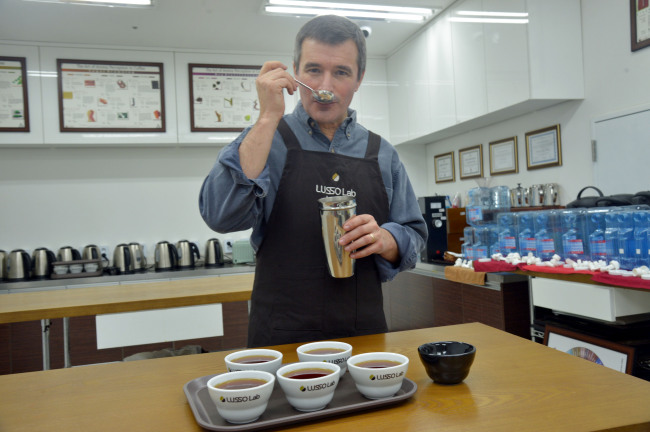
큐그레이더 (커피감별사) 인증시험 감독 및 커피전문가 교육을 위해 한국을 방문한 큐그레이더 인스트럭터 마네 알베스는 "커피 맛을 묘사할 줄 알아야 진짜 커피 전문가"라고 코리아헤럴드와의 인터뷰에서 말했다.
최근 뜨는 직업 중 하나인 큐그레이더 인증시험을 패스하면 커피를 감별하는 감각은 있다는 뜻이지만 그렇다고 해서 모두 커피맛을 묘사할 수 있는 것은 아니라고 그는 덧붙였다.
알베스에 따르면, 커피의 맛과 향은 winey, acidy, enzymatic, spicy, smoky, chocolaty, herby 등 수십가지로 표현 가능하다고 한다.
그는 또한 지난 3년간 수차례 한국을 방문했지만 아직 한국에서 specialty coffee (재배한지 1년 미만의 프리미엄 커피)를 맛보지 못했고, 대부분의 업소에서 주로 past crop coffee (재배한지 1년이 넘은 오래된 커피)를 쓰는 것 같다고 말했다.
큐그레이더 자격은 미국스페셜티커피협회(SCAA) 산하 커피품질연구소(CQI)가 인증하며 2년마다 치러지는 재인증시험(Calibration)을 통과해야 유지된다.
현재 전세계에는 약 2천명 정도의 큐그레이더가 있으며 그 중 약 15 퍼센트 정도가 한국에 있다.
한국에서 이 시험이 치뤄진지 불과 3년 밖에 안 됐다는 것을 감안할 때 큐그레이더가 이렇게 빠르게 증가하고 있는 것은 문제라고 알베스는 지적했다.
"이미 커피전문가인 사람들이 보다 전문적인 교육을 통해 큐그레이더 인증을 받는 것이 보통인데, 이렇게 숫자가 빨리 늘고 있다는 것은 커피에 대한 식견이나 경험이 없는 사람들도 단순히 자격증이나 직업을 얻기 위해 시험을 보는 경우가 많다는 의미"라고 그는 말했다.
미국 버몬트주에서 커피 로스팅 회사와 커피 테스팅 및 전문가 교육 업체를 운영하는 알베스는 매년 남미, 동아프리카 및 동남아 수개국을 방문해 직접 커피를 구매한다.
그는 "산지마다 가장 높은 품질의 커피가 나오는 철이 있는데, 가령 에티오피아와 중남미에서는 그 시기가 2월에서 3월 사이"라며 본인은 에티오피아, 케냐 등 동아프리카산 커피를 가장 선호한다고 덧붙였다.
(코리아헤럴드 김소현 기자)
<관련 영문 기사>
Coffee guru teaches tasting skills to professionals
By Kim So-hyun
A man wearing a black apron savors the aroma of a cup of coffee, and then loudly slurps the liquid so it spreads to the back of his tongue.
He is one of five active Q Grader instructors in the world, and visited Seoul this week to supervise a test to accredit professional coffee tasters, or Q Graders.
With Korea consuming the most coffee per household in Asia, a Q Grader is an emerging career.
“Worldwide, there are close to 2,000 Q Graders now and about 15 percent of them are in Korea,” Mane Alvez said in an interview with The Korea Herald.
“Considering that the test only started in Korea in 2009, the number is too big and this isn’t good for the program because it means a lot of people who are not really coffee professionals are just cramming for the test to get jobs or certificates.”
To sift out non-professionals, a “calibration” is administered every two years to see if those who passed the Q Grader exam still have the coffee cupping, or tasting, ability.
The Coffee Quality Institute, founded by the world’s largest coffee trade association, the Specialty Coffee Association of America, accredits Q Graders who pass a rigorous three-day exam, comprised of 22 sections such as green grading, roast identification, coffee cupping, sensory skills and sensory triangulation.
CQI provides training and technical assistance to coffee producers and other individuals in the supply chain to increase the value, volume and sustainability of high-quality coffee production.
Alvez noted that a genuinely professional coffee taster should be able to describe the taste.
A “Coffee Taster’s Flavor Wheel” shows dozens of different tastes and aromas that coffee can have, such as winey, acidy, enzymatic, spicy, smoky, chocolaty and herby.
“You may have the taste buds to pass the exam, but you may not be able to describe anything about the taste,” he said.
“It is more difficult to tell the taste of coffee than of wine. Wine is easier because the alcohol evaporates.”
Alvez, who has visited Korea several times over the past three years, said the quality of coffee sold here was not good as it was mostly past-crop coffee, or coffee cropped over a year ago. He has not seen specialty coffee here, or premium coffee cropped that year.
“But there is room for improvement,” he added.
“In Korea, people drink mostly espresso, but if you mix it with milk -- it is impossible to tell if it’s specialty coffee or not.”
Specialty coffees are distinctive because of their full cup taste and few defects. They take up about 10 percent of the U.S. coffee market.
Alvez, formerly a winemaker from Portugal, followed a woman to California and later moved to Vermont where he has been working with coffee for the past 25 years.
He runs two companies -- Artisan Coffee which roasts coffee and Coffee Lab International which tests coffee and educates coffee professionals.
His company sells specialty coffee to supermarkets, retailers and a few individuals within only 80 kilometers.
“You place an order and then we roast. That makes the coffee very fresh,” he said.
He travels to a dozen countries including Mexico, Nicaragua, Guatemala, Colombia, El Salvador, Peru, Brazil, Ethiopia, Kenya and Indonesia each year to buy coffee.
“The best Ethiopian and Central American coffees come between February and March, and Brazilian comes much later,” said Alvez whose favorite is East African coffee.
(sophie@heraldcorp.com)


















![[Today’s K-pop] Treasure to publish magazine for debut anniversary](http://res.heraldm.com/phpwas/restmb_idxmake.php?idx=642&simg=/content/image/2024/07/26/20240726050551_0.jpg&u=)